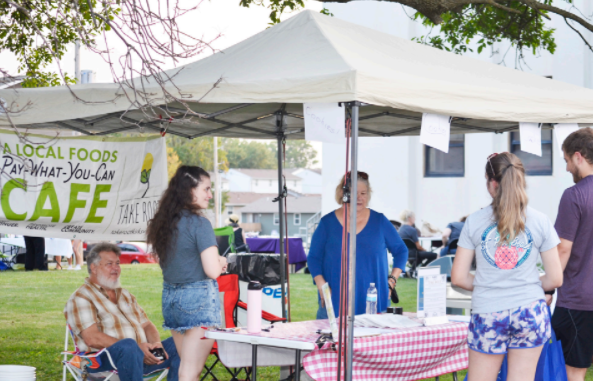
Since its 2016 founding, Take Root has served the Kirksville community in various ways, such as addressing issues of the industrial food system, alleviating hunger in Adair County and promoting healthy living through its signature pay-what-you-can structure.
Founded by Jessica and Tracy Parks, Take Root prides itself on its sourcing of local food and ingredients to create healthy meals. William Robb took over as Take Root’s chief executive from the Parkses during spring 2020.
“I have some kitchen experience, so I get to cook,” Robb said. “I really enjoy cooking and feeding people, but I also take care of the social media and work with the bookkeeper on books and work with the board on finances, so it’s a pretty broad job.”
Prior to joining Take Root, Robb said he worked for a grant-funded horticultural program, specializing in garden construction for prisons. As the grant ended, he began seeking out the next step in his journey. Robb said his position at Take Root is that next step, building upon his experience in various humanitarian organizations.
Robb explained how his understanding of such organizations was certainly useful as COVID-19 propagated across the globe, sending both the largest cities and smallest towns into lockdown.
“I interviewed in a cafe that was thriving and bustling and had a huge community,” Robb said. “And when I showed up to report for work we were closed.”
Robb unknowingly inherited quite the burden, having to shut down the cafe for the greater part of that spring and summer — its busiest time of the year — as the pandemic raged. He explained that when Take Root reopened, there simply was not the necessary volume of business to keep the cafe going.
Following the restaurant’s unfortunate fate, Take Root created a community dinner program to fulfill its mission.
“We pivoted to our community dinner program,” Robb said, “and built that up as a way to deliver on our mission. We just ran our last one for this season — monthly community dinners out of the First Presbyterian Church. We worked with the Health Department to get that kitchen licensed.”
Robb explained that boxed meals served at the church continue the no-cost tradition of the closed cafe with donations, of course, welcomed.
With events like community dinners, volunteer work is available and, according to Robb, needed.
“When we reopen in the spring,” Robb said, “we’ll definitely have a need for volunteers to staff the kitchen at the community dinners and help serve the dinners. The type of food that we prepare is made from scratch, so there’s usually a fair amount of peeling and chopping and so forth.”
While the fall season has since wrapped up, the spring will present new opportunities with the start of the new season in either February or March 2022.
Truman student Jenna Szczeblewski, who has volunteered in the past and currently works as Take Root’s social media and communication coordinator, said the community dinners are a great way to get to know other people in a relaxed environment. Szczeblewski said there are various roles for volunteers to fill, such as taking orders from cars that pull up, bagging orders or even taking pictures and writing brief testimonials for Take Root’s social media. She praised Truman organizations like Cardinal Key, Blue Key and both Greek and non-Greek fraternities and sororities for their recent volunteer efforts.
Robb highlighted two aspects of Take Root’s mission that stand out from other similar organizations.
For one, he said that he wants to continue Take Root’s main focus of putting food on the table for those who need it, emphasizing the prevalence of food insecurity in Adair County.
The second aspect of Take Root’s mission that Robb discussed concerned the economical effort to solve the long-term issue of food insecurity. Ultimately, Robb said he wants to avoid a simple Band-Aid approach.
“That means sourcing as much food as we can locally,” Robb said. “If we buy from a farmer, 100% of the food dollar goes into [their] pocket, but if we buy beef through Walmart, 12 cents of that food dollar will go to the farmer. So, by purchasing locally, you really can cycle the funds and keep them in the community.”
Robb explained that one challenge faced by Take Root is attempting to market local food to those who cannot afford it, food that is commonly more expensive than imported goods.
He proposed that the solution to this dilemma lies in altering the current infrastructure to allow for a local food demand that farmers can satisfy. Robb did not specify on such alterations, but said he was hopeful, rather, for general change.
Looking to the future, Take Root aims to continue its twice-monthly community dinners with the spring season.
“We did two dinners in September,” Robb said. “And I like that rhythm of every two weeks and it’s a good way to get more food out there. When we open in the spring, we’re going to see if we can get secure enough funding to keep our dinners twice monthly.”
Robb said that a new brick-and-mortar location is also on the table with Take Root seeking more permanent asylum.
Thinking long-term, he explained how the organization plans to get involved in food production, perhaps partnering with a local farm or landowner to further that insistence on local food sourcing and educate people on the nutritional benefits thereof.
Despite the ambition behind Take Root’s goals, Robb said he remained hopeful for the organization’s future.
